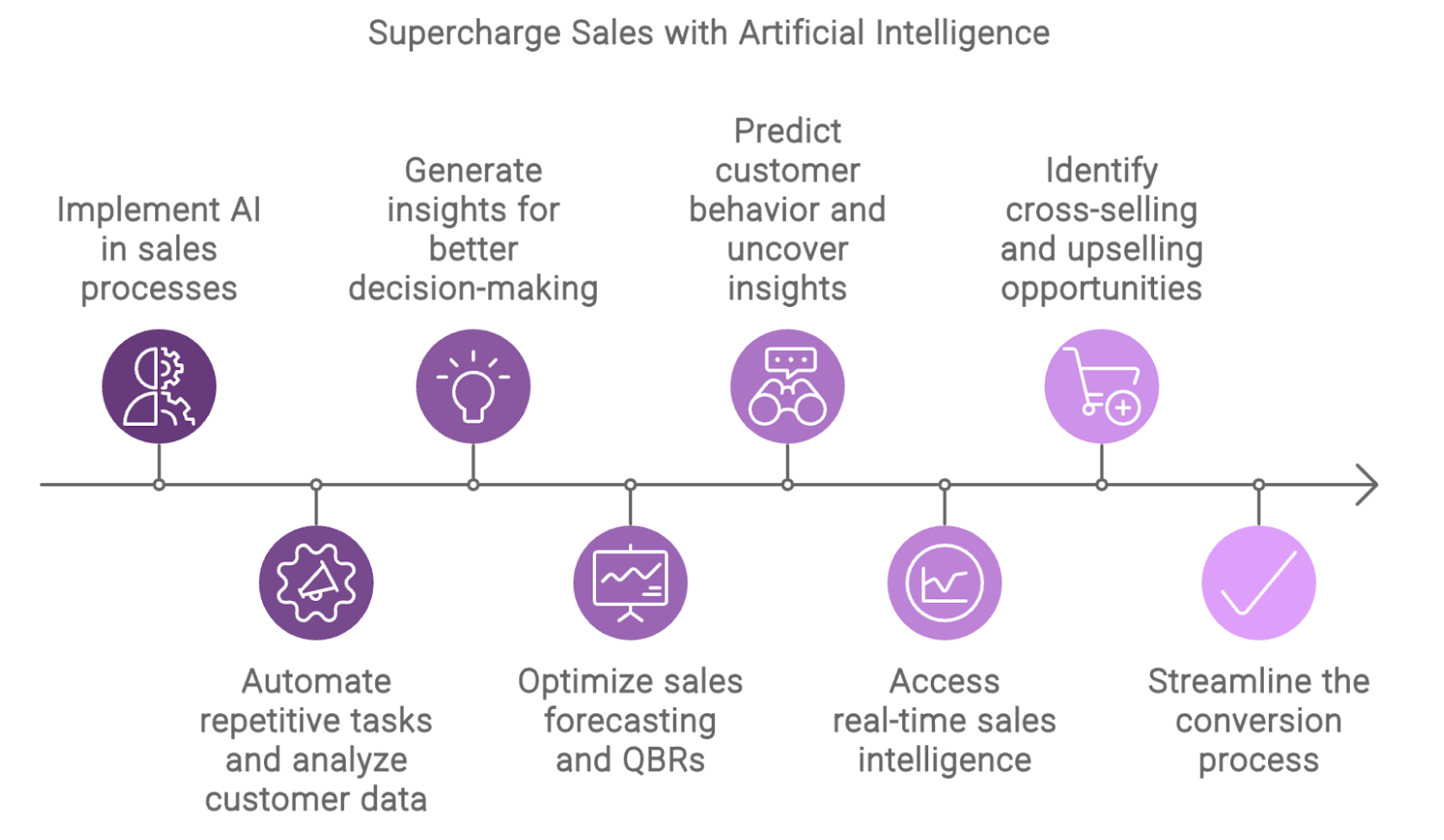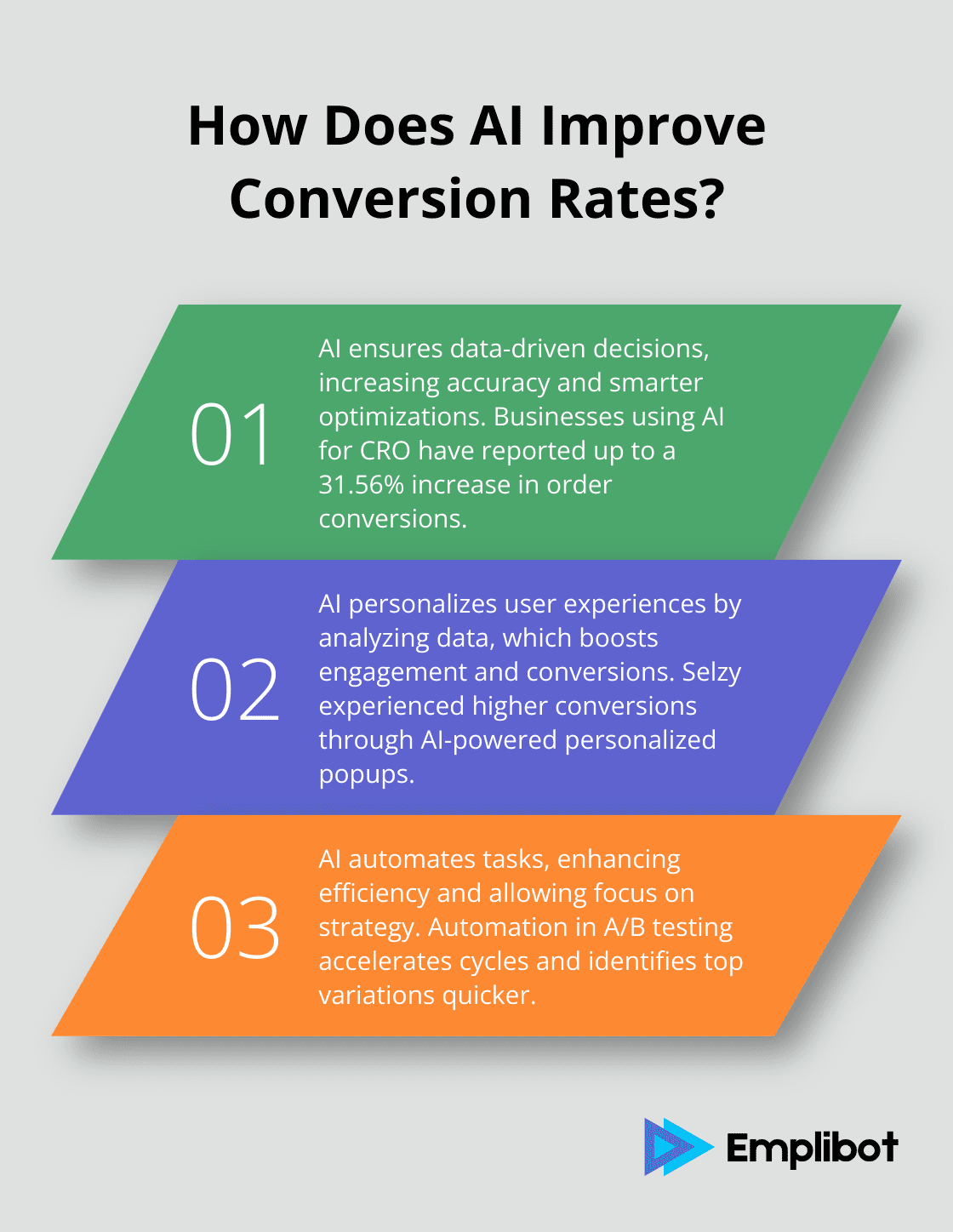In sales, AI has long played a supporting role. Actions such as automating emails, analyzing customer data, and generating reports. But this next evolution of AI is far more transformative. Agentic AI for sales enablement is shifting AI from a passive tool to an autonomous decision-maker, revolutionizing how businesses engage with prospects, optimize sales cycles, and close deals.
Unlike traditional AI, which relies on pre-programmed rules and human intervention, agentic AI operates independently, making real-time decisions, adjusting strategies on the fly, and taking proactive action based on learned insights. We’ve delved deeply into AI Agents, but this levels up somewhat when it comes to Agentic AI in sales enablement.
Sales teams no longer need to micromanage AI tools or manually input every step. Instead, AI functions as a true sales partner—anticipating needs, personalizing outreach, and driving deals forward autonomously.
No more nudging, tweaking, or waiting. It just happens.
Sounds efficient, right? But why does this actually matter?
Because sales is evolving whether you’re ready or not. Companies that incorporate agentic AI now will be the ones scaling faster, converting more leads, and closing deals before competitors even respond.
Want to remain an artisan brand? That’s fine. But if growth is your goal, your sales AI likely needs to level up because everyone else’s will.
AI In Sales Enablement Is Critical for Modern Sales Teams
- Efficiency Gains – Agentic AI automates complex decision-making, reducing manual workload so sales reps
can focus on high-value interactions. - Hyper-Personalization – AI analyzes real-time customer data to craft tailored engagement strategies that
boost conversion rates. - Scalability Without Headcount Growth – Businesses can expand sales operations without significantly
increasing staffing costs, as AI handles repetitive and time-consuming tasks.
Bottom Line? Companies that embrace agentic AI for sales enablement will outpace competitors, delivering faster deal cycles, stronger relationships, and higher revenue growth.
What is Agentic AI?
At its core, Agentic AI refers to artificial intelligence that acts with autonomy, purpose, and adaptability. Unlike traditional AI, which follows pre-set rules and relies on human direction, agentic AI actors (AI Sales Agents) makes decisions on its own, responding to new data and adjusting its approach in real time.
According to Anthropic’s definition, agentic AI, it can:
- Make independent decisions without requiring step-by-step instructions.
- Adjust dynamically to changes in customer behavior and market trends.
- Take meaningful action rather than simply offering recommendations.
In sales enablement, this means AI that doesn’t just assist sales teams but actively engages with prospects, refines messaging, and progresses deals with little to no human intervention. It acts like a salesperson or a salesperson’s assistant, without requiring input.
How Agentic AI Differs from Traditional AI in Sales Enablement
| Feature | Traditional AI | Agentic AI |
|---|---|---|
| Role in Sales | Provides insights for sales teams to act on | Operates as an autonomous sales agent |
| Decision-Making | Follows programmed logic | Learns from interactions and adapts in real-time |
| Personalization | Suggests content based on past data | Crafts dynamic messaging that shifts with customer needs |
| Autonomy | Needs human approval for most actions | Acts within set boundaries without waiting for input |
| Action-Taking | Recommends next steps for humans to execute | Engages leads, follows up, and moves deals forward |
Why This Matters for Sales Enablement
- Faster response times – AI adjusts outreach and follow-ups instantly.
- More relevant messaging – AI personalizes interactions based on live customer data.
- Greater efficiency – AI handles repetitive tasks, allowing sales teams to focus on direct conversations.
By moving beyond passive assistance, agentic AI for sales enablement gives businesses a way to engage prospects, manage leads, and optimize sales pipelines without increasing manual workload.
The Evolution of Sales Enablement: From Supportive to Autonomous AI
Sales enablement has evolved from basic data tracking to AI-driven automation, and now, to agentic AI, which doesn’t just support sales teams but actively participates in the sales process.
Early Sales Enablement: Data and Automation
Initially, sales enablement tools focused on data organization and automation:
- CRM Systems stored customer interactions but provided little strategic guidance.
- Email Automation scheduled follow-ups, but sales reps still had to craft content and decide on timing.
- Lead Scoring Models assigned values based on fixed rules rather than real-time learning.
These tools were passive—providing information but relying on sales teams to take action.
The Rise of AI-Driven Sales Assistance
As AI advanced, sales teams began using machine learning to enhance efficiency:
- AI-powered recommendations suggested content based on customer engagement.
- Chatbots handled basic inquiries but escalated complex issues to human reps.
- Predictive analytics identified trends, but sales teams still had to interpret and act on insights.
AI at this stage was helpful but not independent—essentially an assistant.

The Shift to Agentic AI for Sales Enablement
Agentic AI changes the game by operating autonomously:
- Engages leads independently – AI follows up, schedules meetings, and responds without waiting for human input.
- Learns and adapts – Adjusts strategies in real-time based on customer responses. In particular how AI dynamically improves sales engagement.
- Takes initiative – Sends personalized messages, nudges deals forward, and even handles negotiations within defined parameters.
What This Means for Sales Teams
- Less time spent on admin work – AI takes care of CRM updates and scheduling.
- Better lead conversion – AI engages prospects at the right time with the right message.
- More focus on closing deals – Sales teams can prioritize strategic conversations while AI handles the groundwork.
Using agentic AI, sales teams can scale efficiently, convert more leads, and close deals faster, giving them a competitive edge in the evolving sales landscape.
How Agentic AI Transforms Sales Enablement
Traditional sales enablement focused on tools that supported sales teams with data and automation. Agentic AI takes this further by actively participating in the sales process. This includes analyzing data, making decisions, and executing tasks typically handled by humans.
1. Smarter Lead Qualification and Scoring
Traditional lead qualification methods rely on rigid scoring models. Agentic AI dynamically evaluates prospects in real time, prioritizing high-intent leads and automating follow-ups.
- Analyzes behavior across multiple channels – Evaluates engagement via emails, social media, and website activity.
- Refines targeting over time – Uses machine learning to improve accuracy in lead conversion.
- Triggers engagement when interest peaks – Ensures prospects receive timely outreach.
Example: Rather than assigning static scores, agentic AI detects when a lead spends time on pricing pages and automatically schedules an immediate follow-up.

2. Personalized Customer Engagement at Scale
One-size-fits-all sales approaches no longer work. Agentic AI personalizes every interaction in real time, crafting responses based on individual prospect behavior.
- Adjusts messaging dynamically – Tailors content based on a lead’s past engagement.
- Handles early-stage interactions – Uses AI-driven chat and email to nurture leads.
- Engages prospects across multiple channels – Ensures seamless experiences across email, chat, and social platforms.
Example: AI detects a lead has viewed a case study but not scheduled a demo. It can then automatically send a personalized follow-up addressing potential concerns.
3. Predictive Deal Progression and Pipeline Management
Keeping deals moving requires constant oversight. Agentic AI eliminates bottlenecks by predicting deal momentum and taking action autonomously.
- Identifies at-risk deals – Detects stalled opportunities and proactively follows up.
- Suggests next best actions – Recommends sending case studies, scheduling meetings, or adjusting pricing.
- Provides pipeline insights – Helps teams prioritize high-value opportunities.
Example: If a lead opens a proposal but doesn’t respond, AI automatically sends a follow-up with additional resources.
4. AI-Driven Negotiation and Conversational Selling
Negotiation has always been human-led, but Agentic AI can now handle early-stage objections, suggest pricing strategies, and progress deals independently.
- Offers discounts in real time – Adjusts pricing dynamically based on engagement and company size.
- Handles objections – Uses AI-driven, context-aware responses to address concerns.
- Engages leads 24/7 – AI-powered chat and voice assistants ensure continuous interaction.
Example: AI recognizes budget concerns and proactively offers a limited-time discount to maintain engagement.
5. Optimized Sales Content Recommendations
Sales success relies on using the right content at the right time. Agentic AI identifies what resonates with buyers and delivers tailored content.
- Matches content to prospect needs – Selects relevant case studies, pitch decks, and demo materials.
- Analyzes engagement data – Tracks content interactions to refine future recommendations.
- Automates document sharing – Ensures timely follow-ups with the right materials.
Example: AI detects that a prospect has viewed competitor comparisons and sends a personalized breakdown highlighting unique advantages.
6. Automating Administrative Tasks for Sales Teams
Sales reps spend too much time on CRM updates and scheduling. Agentic AI eliminates these inefficiencies by handling administrative tasks automatically.
- Logs sales interactions – Updates CRM records without manual input.
- Schedules meetings – Sets appointments based on availability and engagement signals.
- Generates performance reports – Provides actionable insights with AI-driven analytics.
Example: AI transcribes and summarizes sales calls, pulling out key points and updating CRM records instantly.
The Business Impact of Agentic AI for Sales Enablement
The shift to agentic AI for sales enablement will be incredibly beneficial for the way sales teams operate. By reducing manual tasks, enhancing personalization, and actively progressing deals, agentic AI allows businesses to sell smarter, faster, and at scale.
Companies that implement agentic AI in their sales processes see improvements across key metrics:
- Shorter sales cycles – AI speeds up deal progression by ensuring timely follow-ups and engagement.
- Higher conversion rates – AI personalizes outreach and negotiates more effectively.
- Increased efficiency – Sales reps spend more time on high-value tasks, not admin work.
Let’s break down the core business benefits, starting with sales efficiency and productivity.
Increased Sales Efficiency and Productivity
Sales teams often struggle with time-consuming processes—from researching leads to following up on cold prospects. Agentic AI for sales enablement ensures reps spend their time where it matters most: engaging with high-value prospects and closing deals.
How Agentic AI Drives Sales Efficiency:
- Less time wasted on low-priority leads – AI identifies and prioritizes high-intent prospects, ensuring reps don’t chase cold leads.
- Automated admin work – AI updates CRM records, schedules meetings, and compiles reports without sales reps lifting a finger.
- Faster deal progression – AI takes proactive actions (e.g., nudging prospects, sending relevant content) to keep deals moving forward.
Example:
A sales rep typically spends one-third of their time on administrative tasks. With agentic AI for sales enablement, they can:
- Cut deal qualification time in half, as AI scores leads and provides real-time insights.
- Eliminate manual CRM updates, allowing them to focus on customer relationships.
- Respond to prospects faster, increasing engagement and improving conversion rates.
The result? Sales teams close more deals in less time, without increasing workload or headcount.
Higher Conversion Rates Through Hyper-Personalization
Personalization has always been a key factor in successful sales interactions. Buyers expect engagement that feels tailored to their needs, industry, and specific pain points. Traditional sales processes rely on predefined scripts and broad segmentation, which often fail to create truly individualized interactions.
Agentic AI for sales enablement takes personalization to the next level by analyzing real-time buyer behavior and dynamically adjusting messaging, timing, and outreach methods. Instead of relying on static personalization (e.g., inserting a prospect’s name into an email), AI crafts unique, context-aware engagement strategies based on actual buyer intent.

How Agentic AI Increases Conversion Rates
- AI continuously adapts sales messaging – Adjusting tone, content, and timing based on real-time interactions.
- Hyper-personalized outreach at scale – AI sends unique, behavior-driven emails, LinkedIn messages, and follow-ups.
- Optimized engagement timing – AI determines when prospects are most likely to respond and triggers outreach accordingly.
Example:
A traditional sales rep might send a generic follow-up email after a demo. Agentic AI for sales enablement goes further by:
- Analyzing buyer behavior – Recognizing that a prospect spent extra time on the pricing page but didn’t request a quote.
- Adjusting messaging in real time – AI sends a personalized email, offering a limited-time discount or a case study on ROI.
- Triggering a timely follow-up – If the prospect clicks the email but doesn’t respond, AI schedules a call at an optimal time.
How Agentic AI Enables Scalable Sales Operations
- Handles customer interactions around the clock – AI engages prospects at any time, across different time zones, ensuring no opportunity is missed.
- Reduces the need for additional sales hires – AI takes over repetitive, time-consuming tasks, allowing existing reps to focus on high-value conversations.
- Supports unlimited customer engagement – AI can process thousands of leads simultaneously, far beyond what a human team can manage.
Hypothetical Example:
Imagine a rapidly growing SaaS company experiencing a surge in inbound leads. They have two options:
- Hire 10+ new sales reps to manage the increased demand.
- Implement agentic AI for sales enablement to autonomously qualify, nurture, and schedule demos.
While AI should be used in support of staff rather than replacing jobs, this does allow the following:
- Improve response times automatically as AI engages leads instantly.
- Cut lead qualification costs since AI filters out low-quality prospects.
- Allow sales reps to focus only on high-intent leads, leading to better close rates.
The end result? Happier sales reps, better systems, and have money leftover to hire those 10 new sales reps later on with a more established business.
While real-world results will vary, businesses that integrate agentic AI into their sales processes often find they can scale operations efficiently without dramatically increasing costs.
What Are The Challenges When Implementing Agentic AI for Sales Enablement?
While agentic AI for sales enablement offers benefits—such as efficiency, scalability, and personalization—it also presents challenges. Companies must integrate AI in a way that enhances sales teams rather than replaces them, ensures data integrity, and maintains ethical transparency with customers.
Adopting AI requires a thoughtful approach, balancing automation with human oversight to maintain trust, productivity, and long-term success. Below, we explore key challenges businesses should address.
1) Trust & Human-AI Collaboration
One of the biggest concerns about AI in sales is whether it will replace human sales reps. While agentic AI can autonomously engage prospects, qualify leads, and even handle negotiations, it lacks the emotional intelligence, strategic thinking, and relationship-building skills that only humans can provide.
To ensure AI supports rather than replaces sales teams, companies must focus on collaboration—allowing AI to handle repetitive tasks while sales professionals focus on complex, high-value interactions.
How to Balance AI Automation with Human-Led Selling:
- Position AI as an assistant, not a replacement – AI should handle lead qualification, follow-ups, and routine tasks, but final decision-making remains human-led.
- Maintain human oversight – AI can predict deal outcomes and suggest pricing, but reps should validate and approve critical decisions.
- Educate sales teams on AI’s role – Clear communication ensures AI is seen as an enabler, not a threat.
Example:
A company implements agentic AI for sales enablement to handle initial prospect engagement and qualification. However, instead of fully automating the process, they:
- Ensure AI-passed leads go through a human rep before final conversion.
- Allow reps to override AI-generated recommendations when necessary.
- Train teams to use AI-generated insights as a tool for smarter decision-making, rather than relying on it blindly.
By integrating AI and human expertise strategically, companies can increase efficiency while maintaining trust, creating a sales process that is smarter, faster, and more effective.
2) Data Accuracy & AI Bias
AI-powered sales tools rely entirely on data to make decisions. If the underlying data is incomplete, outdated, or biased, even the most advanced agentic AI can make flawed recommendations, misqualify leads, or reinforce existing biases.
To ensure AI truly enhances sales enablement, businesses must address data quality issues and implement safeguards to prevent AI from making skewed or misleading decisions.
What Are The Challenges of Poor CRM Data?
- Lead information is outdated – Contacts change roles, companies pivot, and AI may still be working off irrelevant data.
- Data is inconsistent – Some reps update CRM fields diligently, while others don’t, leading to gaps.
- AI learns from biased patterns – If past data reflects historical biases (e.g., favoring certain industries or regions), AI may unknowingly reinforce these patterns, excluding qualified prospects.
How to Improve AI’s Decision-Making with Better Data
- Standardize CRM data entry – Ensure all reps follow a consistent process for updating lead status, engagement history, and key deal metrics.
- Implement real-time data validation – Use AI tools to cross-check CRM records against live data sources (e.g., LinkedIn, firmographic databases) to keep information fresh.
- Train AI on diverse, unbiased datasets – Regularly audit AI models to detect and correct unintended biases in lead scoring, pricing recommendations, or deal prioritization.
Example:
A sales team notices that their AI system is aggressively disqualifying small businesses. Upon investigation, they realize:
- Historical CRM data favored enterprise deals, biasing the AI toward larger accounts.
- They update the model to incorporate new success metrics, ensuring AI reassesses small-business leads fairly.
By improving data accuracy and eliminating bias, businesses can ensure agentic AI makes fair, data-driven decisions—leading to better lead qualification, more diverse customer acquisition, and stronger overall performance.
3) Ethical AI in Customer Interactions
As agentic AI for sales enablement becomes more sophisticated, an important question arises: Should customers know they’re interacting with AI? While AI can streamline sales conversations and provide instant responses, transparency is key to maintaining trust and ethical responsibility.
Companies must carefully balance efficiency with honesty, ensuring AI-driven interactions feel authentic while respecting customer preferences.
Key Ethical Considerations in AI-Driven Sales Enablement:
- Disclosure & Transparency – Should businesses inform prospects when they’re speaking to AI? While some customers may appreciate AI-driven efficiency, others may feel misled if they assume they’re engaging with a human.
- AI-Generated Messages vs. Human Interaction – AI can handle routine inquiries, follow-ups, and lead qualification, but should it be making high-stakes sales decisions without human oversight?
- Customer Consent & Preferences – Companies should allow customers to opt out of AI-led interactions, giving them the choice to speak with a human when needed.
Example:
A sales team deploys agentic AI-powered chatbots to handle initial customer inquiries. Instead of disguising AI as a human, they:
- Clearly label AI-driven interactions (e.g., “I’m an AI assistant here to help!”).
- Provide an easy way to escalate conversations to a human rep if the customer prefers.
- Ensure AI adheres to ethical data usage guidelines, avoiding misleading claims or manipulative tactics.
By maintaining transparency and ethical AI practices, businesses can build stronger customer relationships while still benefiting from AI-driven efficiency in sales enablement.
What Is The Future of Agentic AI for Sales Enablement?
As agentic AI for sales enablement continues to evolve, the next big shift will likely be fully autonomous AI sales agents. This is AI that doesn’t just assist sales teams but manages entire customer journeys from first contact to deal closure. This transformation will redefine sales roles, creating new opportunities while requiring businesses to rethink how they integrate AI into their sales processes.
How Agentic AI Will Transform Sales
Some of the ways this could unfold include:
- AI handling full-cycle sales conversations – Beyond lead qualification, AI will negotiate terms, answer complex objections, and close smaller deals autonomously.
- AI-driven relationship management – AI will track ongoing customer interactions, ensuring long-term engagement and proactive renewal strategies.
- Deep learning-powered decision-making – AI will refine its approach based on real-time data, customer sentiment, and past successes, making smarter, more strategic sales moves.
How To Prepare for the AI-Powered Sales Future
As AI capabilities expand, companies that embrace AI-driven sales enablement early will gain a significant competitive edge. The key is to integrate AI in a way that enhances human sales teams, ensuring that AI and human reps work together for maximum efficiency and impact.
As agentic AI becomes more advanced, sales teams must adjust their approach to maximize its potential. AI isn’t replacing sales professionals, but it will change how they work. The key is knowing where AI fits into existing processes and how to train teams to use it effectively.
Businesses that approach AI thoughtfully can automate administrative tasks, support outreach, and improve customer interactions while keeping human reps focused on high-value conversations.
Bringing AI Into Existing Sales Strategies
It doesn’t even have to be about totally reinventing the wheel when it comes to slotting it in, but merely adjusting and finding the areas that would benefit the cycle most. Things such as:
- Use AI for support, not full automation – Start with AI for lead qualification, scheduling, and content suggestions, keeping sales reps in control of critical decisions.
- Define AI’s role clearly – Ensure AI is solving the right problems (e.g., improving response times, prioritizing leads, or enhancing follow-ups) rather than adding complexity.
- Review AI-driven interactions regularly – Monitor how AI engages with prospects and adjust settings as needed.
Helping Sales Teams Work With AI
Also, one of the main things to take into consideration is the human element, and how sales teams can be encouraged to work with AI, particularly if they are concerned about job security in the long-run. This can be administered by:
- Training reps on how to use AI-generated insights – AI can spot trends, but sales teams must interpret and apply that information effectively.
- Developing skills AI can’t replicate – Relationship-building, negotiation, and understanding emotional cues remain key human strengths.
- Makin AI a tool, not a crutch – Encourage teams to use AI for efficiency while remaining hands-on with deals that require nuance.
Why Is Agentic AI for Sales Enablement the Future of Selling?
The rise of agentic AI for sales enablement is reshaping how businesses approach sales—from automating lead qualification to personalizing customer interactions and optimizing deal progression. By handling repetitive tasks and improving efficiency, AI allows sales teams to focus on what they do best: building relationships and closing deals.
One of the biggest challenges in AI-driven sales enablement is ensuring that valuable insights don’t get lost in the process. This is where tools like tl;dv play a crucial role. By automatically recording, transcribing, and summarizing sales calls, tl;dv ensures that AI-powered sales agents and human reps alike have access to accurate, searchable customer insights. Instead of relying on fragmented notes or memory, AI can analyze real conversations, extract key moments, and help sales teams take action based on real customer needs.
Now is the time for companies to invest in AI-driven sales automation. Businesses that integrate AI strategically, along with AI-powered conversation intelligence tools like tl;dv, will see shorter sales cycles, improved conversion rates, and greater scalability without additional headcount.
While AI can handle much of the groundwork, sales success still depends on human expertise. The most effective sales teams will be those that embrace AI as a partner, not a replacement—using it to work smarter, engage prospects more effectively, and drive revenue growth in ways that weren’t possible before.





